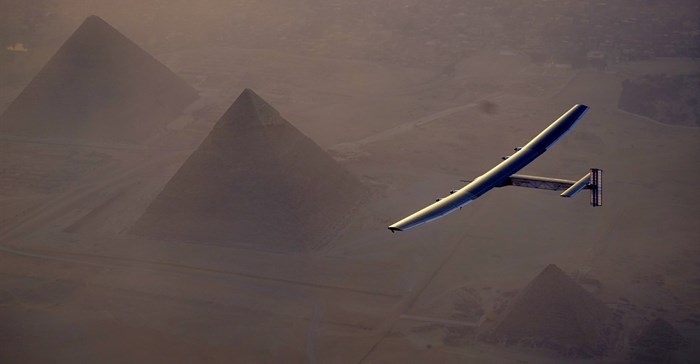
Top stories




ESG & Sustainability#AGES2026: How to back Africa's next-gen green and blue entrepreneurs
Maroefah Smith 26 Feb 2026


AutomotiveFoton breaks into South Africa’s top commercial vehicle ranks in just over a year
Foton 1 day
More news


The Solar Impulse 2 (Si2) landed in Egypt after flying for two days and two nights without fuel. This flight crossed the Mediterranean Sea from west to east and covered a distance of 3,745km powered only by the sun. The goal of which is to demonstrate how modern clean technologies can achieve the impossible.

“This was an emotional and meaningful leg for me, being able to enjoy once more the incredible sensation of flying day and night thanks only to the energy of the sun and enjoying fully the present moment,” says André Borschberg, who flew the solar-powered aircraft to Egypt.
Solar Impulse is a Swiss long-range experimental solar-powered aircraft project, and also the name of the project's two operational aircraft. It is privately-financed and led by Borschberg and psychiatrist and aeronaut, Bertrand Piccard.
The aircraft are single-seat monoplanes powered by photovoltaic cells; they are capable of taking off under their own power. The prototype, often referred to as Solar Impulse 1, was designed to remain airborne up to 36 hours. It conducted its first test flight in December 2009. In July 2010, it flew an entire diurnal solar cycle, including nearly nine hours of night flying, in a 26-hour flight.
The second aircraft, completed in 2014 and named Solar Impulse 2, carries more solar cells and more powerful motors, among other improvements.
Its wingspan is 71,9 m, slightly less than that of an Airbus A380, the world's largest passenger airliner, but the carbon-fibre Solar Impulse weighs only about 2,3 tonnes. It features a non-pressurised cockpit, advanced avionics, including an autopilot to allow for multi-day transcontinental and trans-oceanic flights.
Supplemental oxygen and various other environmental support systems allow the pilot to cruise up to an altitude of 12,000m.
The top of the wings, fuselage and tailplane are covered by 17,248 photovoltaic cells, which power four electric motors and four 41 kWh lithium-ion batteries.
The final leg of the trip is the 2,500km journey from Cairo to Abu Dhabi.